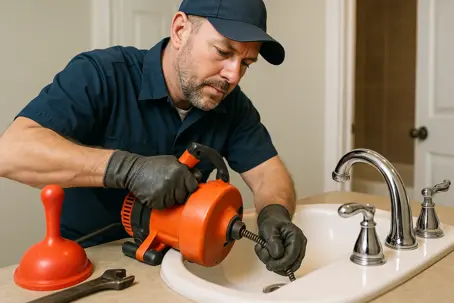Drains. They’re probably the last thing you want to think about. If you’re like most of us, you’d rather be strolling through the Little Cypress Creek Preserve or shopping at the outlet mall.
But if you’re a homeowner, then drain issues are going to rear their heads eventually. It’s important that you understand them, and understand what to do when they get clogged.
To that end, here are answers to the five most common questions we get from our Cypress customers about their drains.
#1) Are Chemical Drain Cleaners All That Bad?
Yes.
We know. It’s really tempting to reach for the cheap quick fix. But they can quickly turn a simple drain clog into a huge plumbing nightmare.
Why? Because they’re corrosive.
So they:
- Damage and weaken pipes, which can lead to big leaks which you wouldn’t have had if you’d stepped away from the Draino.
- Can injure you. They send roughly 3,000 people to the hospital every year.
- They typically don’t solve the problem, which means the clog keeps returning.
If all this is true, why do companies keep selling them?
The illusion of effectiveness. They can sometimes clear very minor clogs, and the damage they’re doing to the pipes isn’t immediately visible. The consequences of the damage may not show up on the same day, or even on the same month or year. But rest assured, the more you pour down your pipes the more you can expect to pay in real plumbing services later.
#2) Can I Clean My Drains With Baking Soda, Vinegar, and Hot Water?
This oft-cited home remedy comes with its own dangers.
Many modern Cypress homes have PVC and ABS plastic pipes. Boiling water is going to melt and warp those pipes, which means you’ll eventually cause a leak. Yes, they can withstand hot water, but hot water is not boiling water. PVC can handle up to 140°F, whereas boiling water is 212°F.
ABS pipes have a slightly higher heat resistance of 176°F, but 212°F is still greater than 176°F.
And when one pot of boiling baking soda water doesn’t do the trick, many people are tempted to throw gallon after gallon down there. The inevitable damage is soon to follow.
“No problem,” you are saying. “I have copper pipes.”
Do you? Do you know for sure every part of your plumbing system uses copper pipes? Some systems are quite hybridized. Unless you built your home from the ground up, it’s best to assume that boiling water is a bad plan.
And while that baking soda and vinegar combo does create a neat, satisfying fizzy reaction, it’s not really powerful enough to dislodge major clogs. You might shake a minor blockage loose that way, but you won’t take down most clogs.
#3) What’s the Difference Between Home Drain Cleaning Methods and Professional Drain Cleaning Methods?
At home, your options are plungers, coat hangers, and a list of bad liquid options we’ve already gone over.
When we show up, we show up with hydrojets and professional snake augers. We also show up with the know-how to use those snake augers. We know you can buy one at a big box store, but if you don’t use it correctly you can create a bigger clog or break your lines, turning a small problem into a huge expensive problem.
We also show up with sewer inspection cameras so we can figure out exactly what’s going on in your system. Without those cameras, you can only rely on guesswork, and as we’ve covered, guesswork can be extremely dangerous.
#4) When Is a Clogged Drain an Emergency?
Consider a clogged drain an emergency if:
- A little plunging doesn’t do the trick. A plunger can sometimes dislodge a minor surface-level clog, but if it doesn’t work after a few tries you should stop knowing you’ve exhausted your only safe alternative. This is a clear sign the problem is more complex and a professional should take over.
- When the clog is accompanied with foul odors.
- When the clog is significantly impacting your ability to flush your toilets, do your dishes, run your dishwasher, or take a shower.
- When the clog keeps coming back. If you plunged it away on Tuesday and it’s back like a bad in-law on Friday, then it’s best to call us.
Our drain cleaning services are affordable and effective. You can also get a free estimate before we begin work. If you’ve got a serious clog, you’ve got great reasons to let us take a look at it.
#5) How Often Should I Clean My Drains?
Regular drain cleaning can help you avoid emergency plumbing services. Scheduling these services is a great investment into your Cypress, TX home.
We recommend getting your drains looked and cleaned every 1-3 years. If you have an older home, consider more frequent cleanings, or have us quote you a whole-house repipe to reduce the risk of regular clogs.
Has it been awhile since you’ve had your drains cleaned and inspected? Contact us to get started today!
